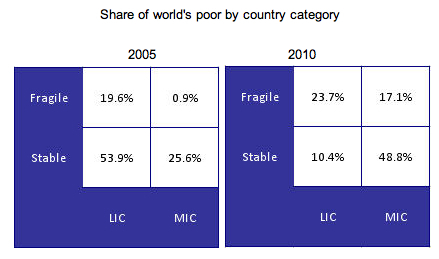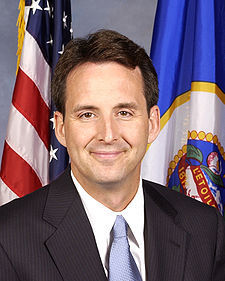Matthew Yglesias's Blog, page 2303
May 20, 2011
Culture Of Harassment At The IMF
Dominique Strauss-Kahn's personal misconduct aside, the New Look IMF under his watch has actually been doing some very important work the past several years keeping the Keneysian torch alive even as most western governments abandoned it. But Binyamin Applebaum and Sheryl Gay Stolberg report that the whole institution was awash in an alarming culture of sexual harassment and male impunity that provides the context for DSK's (alleged!) assault:
Interviews and documents paint a picture of the fund as an institution whose sexual norms and customs are markedly different from those of Washington, leaving its female employees vulnerable to harassment. The laws of the United States do not apply inside its walls, and until earlier this month the I.M.F.'s own rules contained an unusual provision that some experts and former officials say has encouraged managers to pursue the women who work for them: "Intimate personal relationships between supervisors and subordinates do not, in themselves, constitute harassment."
"It's sort of like 'Pirates of the Caribbean'; the rules are more like guidelines," said Carmen M. Reinhart, a prominent female economist who served as the I.M.F.'s deputy director for research from 2001 to 2003. "That sets the stage, I think, for more risk-taking."
I'm not actually sure how that relates to Pirates of the Caribbean, but apparently an internal review conducted in 2008 concluded that "the absence of public ethics scandals seems to be more a consequence of luck than good planning and action." But that's not good luck in the sense of thanks to our good luck nothing bad is happening. It's more like good luck in the sense of lucky for us, nobody's coming forward and making a fuss. Lots of stuff like this:
In another case, a young woman who has since left the I.M.F. said that in 2009, a senior manager in her department started sending her increasingly explicit e-mails seeking a relationship. She complained to her boss, who did not take any action.
More gross stories at the link if you can stomach it.


Fix 'Bones' By Going Federal
Holy spoiler alert, Batman. Definitely don't read this unless you've watched last night's Bones season finale.
Hart Hanson, Bones' creator, can be a fairly devious guy. He's promised he'll get his heroes, anthropologist Temperance Brennan and FBI agent Seely Booth, together only to deliver a dream sequences, and come up with baroque scenarios to keep his will-they-or-won't-they couple apart. But last night, on the Bones finale, Hanson pulled the trigger:
yes, Booth and Brennan slept together in the previous episode. And now Brennan's pregnant. It was a relief to see Hanson finally make a major decision about the couple, and to settle on a solution that didn't just get them together, but that tied together emotional threads that he's been spooling out for years, include Brennan's desire for a baby and Booth's worries about being a presence in his child's life.
But that Bones did so well at sustaining a multi-season emotional arc makes me wish the show was a bit better at doing the same thing with the cases the team works on. Sure, it's funny to see David Boreanaz in what appears to be his Angelus wig in a bowling alley, but the show has a terrible weakness for deeply goofy one-off stunt episodes that detract from some of the real power of what the characters do. This may be a controversial opinion, but I think the best season of Bones is the writers' strike-shortened third, in part because it integrated both Max's trial and the Gormogon case in a way that was narratively exciting and spurred a lot of growth for the characters. Similarly, Howard Epps and the Gravedigger have been good Big Bads (particularly the Gravedigger), but spacing out the episodes with each of those characters over multiple seasons has slackened promising narratives. And I thought the sniper arc this season was quite poorly done: there's nothing worse than a boringly moralistic villain who distracts from rather than brings out the core character developments going on around him.
But I think there's an easy solution to this: have the characters work more truly federal cases. I get that Brennan, because of her special expertise, gets loaned out to work on local crimes, but she and Booth are both federal employees. And it's not like there are no ongoing federal investigations that would produce a lot of really gross-looking bodies! They could work a big mob investigation, or a terrorism case, or take on something like the Beltway Sniper rather than inventing a carboard insane veteran—hell, I'd love to see the FBI loan out Booth and Brennan to Mexico and have them investigate the femicides in Juarez. Not every episode has to be devoted to the main case—Buffy's the perfect template for how to fit one-offs amidst major investigations—but having an overarching problem pulls a season together in useful ways. I'm not saying that Bones should become The Wire: the show's eccentricities are integral to its charm. But the show runners should trust their ability to pull off long case arcs—and remember the payoffs they've reaped from big investigations in the past.


Huntsman Challenges Obama From The Left: "What We Have in Afghanistan Today is Not Consistent With How We Ought To Be Responding"

Former Utah Governor Jon Huntsman has a record that is in some ways encouragingly progressive, especially for a Republican from a conservative state, and he served in an important role on Barack Obama's foreign policy team as Ambassador to China. Under the circumstances, it's intriguing to see how his views on international affairs differ from the president's.
In an interview this morning with George Stephanopoulos on ABC News' Good Morning America, Huntsman indicated that he's inclined to challenge Obama from the left on the war in Afghanistan, observing that "it is a heavy and very expensive presence we have on the ground" that's "not consistent with how we ought to be responding":
George Stephanopoulos: You also said, in the event, that a draw-down in Afghanistan is inevitable. So would you begin it today?
Jon Huntsman: I would tell you that we have to evaluate very carefully our presence in Afghanistan. And my inclination would be to say that it is a heavy and very expensive presence we have on the ground. That at a point in time where we need to be looking at our asymmetrical threats, what we have in Afghanistan today is not consistent with how we ought to be responding.
When asked about Afghanistan at a Meet and Greet yesterday in New Hampshire, Huntsman called a drawdown "inevitable" and said there would likely be civil war in Afghanistan when a U.S. withdrawal created a vacuum. "And I'm not sure there's a whole lot we can do about that," he added. Huntsman seems to reach this conclusion on traditional realpolitik grounds similar to the brand of foreign policy that dominated the Republican Party until George W. Bush brought neoconservatism to the fore.
Earlier in the interview, Huntsman said that he would not have intervened in Libya's civil war on the grounds that the rebellion again Muammar Gaddafi "is not core to our national security interest." But the death of Osama bin Laden is driving growing calls from multiple perspectives for a rethink of America's posture in Afghanistan. CAP's Caroline Wadhams and Colin Cookman have observed that his passing "does offer the Obama administration an opportunity to reassess the challenges in Afghanistan" in order "to reduce our military and financial investments" in that country. Meanwhile, NATO forces in Afghanistan are increasingly getting drawn into clashes with protestors indicating that their presence is not necessarily welcome to the local population. My view is that this would be an excellent opportunity to declare victory and go home, refocusing counterterrorism on law enforcement and intelligence strategies and de-militarizing humanitarian engagement with Afghanistan.
Earlier in the month, one of Huntsman's rivals, former Minnesota Governor Tim Pawlenty delivered a confusing series of positions on Afghanistan and other candidates have been slow to address it. Hopefully Huntsman's decision to inject a traditional realist perspective into the debate and argue from a progressive perspective against the wastage of funds on military pursuits at a time of fiscal austerity will widen the range of perspectives under consideration in Washington.


Real Wages For The Employed Now Falling
Jared Bernstein notes the interesting fact that for the bulk of the recession real wages were actually going up for those of us who managed to not lose our jobs. But that's turned around:

For all the same reasons that employers like to open factories in China rather than Indiana when possible, falling real wages will tend to increase employment (you see a hint of this in the fact that weekly wages are falling slower than hourly wages). Basically when the powers that be fail at Plan A for avoiding mass unemployment, then fail at Plan B, Plan C, Plan D, and Plan E this is the Plan Q that you end up stuck with. Wages fall, so demand for labor grows and you'll reach a new equilibrium at some point. And of course on Wall Street and the CEO's office, pay has never been higher.


Jon Huntsman Eyeing Monetary Crankery As A Means Of Closing Dangerous Wingnut Gap

As my colleague Travis Waldron has previously reported, Jon Huntsman has an encouragingly reasonable record especially for someone who was governor of such a conservative state as Utah. Given that the US-China relationship isn't a super-ideological matter and that US policy in East Asia is in general somewhat insulated from partisan politics, this sort of record seemed to make him a strong choice to serve as Barack Obama's ambassador to Beijing. But as a GOP presidential primary candidate, this record's left him with a dangerous Wingnut Gap that makes him unsuited for the current temper. But speaking this morning with George Stephanopoulos, Huntsman sought to close that gap, adopting new and wrongheaded positions on fiscal stimulus, embracing repeal of the Affordable Care Act, and going all-in on the House GOP Medicare repeal plan.
But even better, he opened a fresh front in wingnuttery by linking his desire to eliminate Medicare to some crank thinking on monetary policy issues:
Jon Huntsman: I would've voted for it.
George Stephanopoulos: Including the Medicare provisions?
Jon Huntsman: Including the Medicare provisions. Because the only thing that scares me more than that is the trajectory that our debt is taking. And the trajectory that our debt is taking now beyond $14 trillion is going to have an impact on our currency. It goes south, and our currency's going to have an impact on our standard of living and affect every family in this country, and over time, our international competitiveness. So what is really scary I think to me and I think most Americans is our debt. And we've got to be bold, and we've got to have, I think, proposals on the table that perhaps in years past would've been laughed out of the room. And we've got to look seriously at them. We don't have a choice. We've hit the wall.
To offer a few more words of praise for Huntsman, it's important to understand that Rep Paul Ryan (R-WI), main author of the Medicare Repeal initiative, is also a monetary crank. Such crankier is on the rise in the conservative movement, but relatively few of the politicians who've embraced Ryan's proposed elimination of Medicare seem to understand its underlying ideological premises as rigorously as Huntsman does. So good for him. Medicare repealers would often like us to believe that eliminating the program will somehow improve the quality or cost-effectiveness of the health care received by senior citizens. Huntsman, however, correctly says this is an idea that should be "laughed out of the room."
Instead he's embraced the also laughable idea that we should eliminate Medicare in order to make foreign-made manufactured goods and international travel cheaper. Does that make sense as a policy priority? On the one hand, we decrease employment in the health care sector while on the other hand we decrease employment in US export and import-competing industries? The causal mechanism here is slightly plausible. If you really wanted to implement a manufacturing-wrecking expensive dollar policy, eliminating could be part of the package. But why would you want to do this?


Most Poor People No Longer Live In Poor Countries
It seems intuitive that poor people would live in poor countries, but the combination of rapid economic growth in China and India with those countries' gigantic populations means that's no longer the case. Today, most poor people live in middle income countries according to an analysis from Laurence Chandy and Geoffrey Gertz for Brookings which also notes that many of the global poor live in states that are "fragile" in terms of their stability:

I think one way of reading this chart is also as underscoring the value of a functioning state. Low income countries that are stable have tended to graduate to middle income status pretty quickly.


May 19, 2011
Endgame
A different dimension:
— "Health Inflation, Wealth Inflation, and the Discounting of Human Life".
— "The Elusive Craft of Evaluating Advocacy" (PDF).
— Keynes stuff.
— Most Americans support marriage equality.
— 41 percent of Americans say Jesus Christ will return by 2050 which makes complacency about climate change a lot easier to understand.
— Newt Gingrich lectures the world on how unprepared we are for the world-historical nature of the Gingrich campaign.
— 31 percent of Pakistanis say the ISI knew where bin Laden was.
Katy Perry, "E.T."


How Can Borders Israel's Defended In The Past Be Indefensible?

Given Benjamin Netanyahu's scorn for negotiating on the basis of the 1949 armistice lines, it seems to me that it's eminently reasonable to ask whether the Israeli government will recognize Palestine's right to exist:
Mr. Netanyahu, who is due to meet with Mr. Obama at the White House on Friday in what seems likely now to be a tense encounter, added that the commitments "relate to Israel not having to withdraw to the 1967 lines which are both indefensible and which would leave major Israeli population centers in Judea and Samaria beyond those lines," a reference to large Israeli settlement blocs in the West Bank.
The point about the settlements is perfectly valid. Having illegally build Israeli towns and suburbs on occupied land, the Israeli government naturally prefers not to give the land up. But how can the borders be indefensible? How does Netanyahu think Israel managed to win the war that gave them control over the West Bank? The defensible borders issue certainly sounds more sympathetic than the "we want to keep as much land as possible" issue, but unlike desire to grab land it doesn't make any kind of sense.
I think it would be healthier to just state things frankly. Netanyahu wants the settlements that exist to expand, he wants new settlements started, and he doesn't want to give up the settlements that he has. Meanwhile, it seems to me that the Obama administration keeps answering the wrong question. They keep telling us what they want the Israeli government to do. And what they want it to do, basically, is have different preferences. But the question for Obama isn't what Israeli policy should be, it's what should American policy be.


Tim Pawlenty Is Running For President Because He Doesn't Want To "Play Hockey and Drink Beer."

Tim Pawlenty's book is called Courage to Stand: An American Story and it certainly takes some kind of courage to run for president and then sit down for multiple interviews with a Time Magazine correspondent doing a profile without having come up with an explanation of why you're running:
And when I ask Pawlenty, during a second interview in Des Moines, Iowa, exactly when he decided he was up to the grand challenge of the presidency, he answers in less than grandiose terms, explaining how he'd set up a political-action committee in 2009. I try again, saying I am curious about when he first imagined himself worthy of the history books, ready to send soldiers to their deaths and endure the national stage's harsh toll. "I don't know," he replies. "I wish I had a good answer for you on that." Pawlenty says it is not an idea that crossed his mind 15 or 20 years ago but that as he considered life as a relatively young ex-governor, he felt obliged not to take the easy path and "go make some money and play hockey and drink beer." He adds that he almost didn't run at all. "Mary and I talked about this at length, and many times, and it was a close call," he says, mentioning his wife of 24 years. He adds with a laugh, "It could have gone the other way for all the reasons you're suggesting."
What kind of answer is that? If Pawlenty didn't want to make money, play hockey, and drink beer he had any number of options available. He could be doing charity work in Africa. He could found a charter school. He could have run for re-election as Governor of Minnesota. But he decided to step aside even though he wasn't term limited in order to take on an incumbent President of the United States. And he seems like the kind of guy who could win. But "I seemed like the kind of guy who could win" isn't a very good reason for running.


How Do You Talk About Borders Without Talking About Jerusalem
Something I didn't understand about today's presidential speech was the idea that resolution of the Jerusalem issue could somehow be deferred in favor of first negotiating a settlement about borders, based on the 1949 cease fire lines. The old cease-fire lines ran right through Jerusalem. Here's a map showing (in yellow) the Israeli-defined municipal boundaries of Jerusalem, the Israeli-built security wall, the old cease-fire line, and Israeli settlements in the Jerusalem area:

Obama's idea, consistent with the Clinton parameters, is that rather than strict adherence to the cease-fire line, the two sides should negotiate "land swaps" in which Israel annexes some settlement land and in exchange gives Palestine some extra territory elsewhere. But some of this land swapping is going to have to happen right here in the Jerusalem area. The question of the border and the disposition of Jerusalem seem intimately linked.


Matthew Yglesias's Blog
- Matthew Yglesias's profile
- 72 followers





